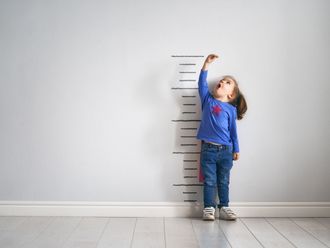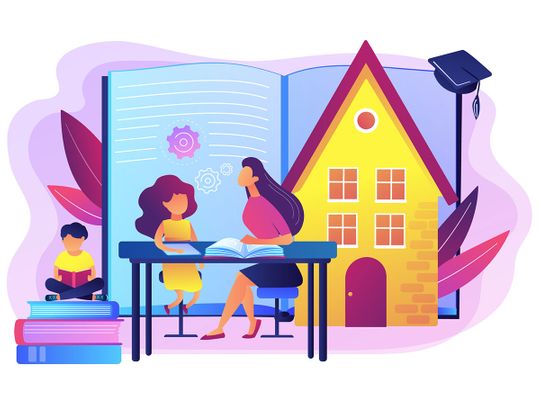
School begins around the same time each morning – but there’s no formal bell to be rung. Dressed in the most outrageous outfits – or in pyjamas, depending on the mood of the day – the lesson can begin. That’s the thing about homeschooling – it allows for flexibility in not only time but also lessons and uniforms. It’s a tailored teaching method – made just for your child. No wonder some studies show that students who’ve been taught at home instead of in a conventional classroom might do better.
According to a paper by Brian D. Ray published in the US-based National Home Education Research Institute, “78 per cent of peer-reviewed studies on academic achievement show homeschool students perform statistically significantly better than those in institutional schools.”
In the UAE, there are thousands of students who are headed the homeschool way; the Facebook group Dubai and Northern Emirates Homeschool Association (DUNEHA) has more than 6,000 members and little pockets of homeschoolers make their own small on-the-ground or social media groups as the numbers multiply.
For some, it’s a dive into the research behind homeschooling that’s got them hooked, for others, it’s a more practical consideration that takes into account finances, the pandemic and transitory lifestyle.
Sometimes, homeschooling gets a bad rep; it’s said to stunt socialisation in little humans – but, proponents counter, that’s just hogwash. “Unless you are in an isolated place, that won’t happen,” explains Aminah Cooper, founder of DUNEHA. “Our group is quite active, pre-COVID we had daily, weekly, monthly activities; the group was extremely vibrant so we are looking forward to a return to everything opening up, so the activities can continue.”
Mum-of-four Victoria, who requested that only her first name be used for this article, stresses: “They [homeschoolers] get a better quality of friend because they get to be intentional about who they get to spend their time with.”
And South African expat Melanie Penny explains that her daughter gets “more free social time with people than sitting in a classroom and getting 20 minutes a day to talk to other kids”.
Why choose homeschooling?
Jalaja Ramanunni, a yoga instructor in Dubai, explains, “My daughter is three-and-a-half years old, and we're interested in equipping her with life skills that aren't a priority at conventional schools. Homeschooling gives us the freedom to expose her to a wide range of activities and deep dive into the ones she's interested in.”
“As parents, homeschooling gives us the freedom to take a different approach if the child doesn't show interest in a subject or a skill,” she adds.
“There are so many ways to homeschool - you can freestyle, follow a curriculum, hire private tutors, send them for activity classes or take on the role of an educator yourself,” she says.
Dad-of-one Suniel Chippa admits to some positives to homeschooling, but says he can also see the benefits of a traditional, physical class; he prefers a hybrid mode of teaching. ““Traditional schools have several advantages e.g., structured routine, team spirit, physical development, access to various sports, lifelong friends, better exposure outside of home, overall development of children, etc. I would say that both systems have their own advantages and an appropriate mix of both can pave the way for a more sustainable, holistic, lifelong learning, creating win-win perspectives for all stakeholders, namely students, parents, teachers and overall, communities.”
2. Identify the mode of learning that will work best for you, recommends Melanie Penny. “Do your research about what fits best for your child and you. You want online? More book space, more online? Does your child like art? Want it to be more hands-on? Each child is amazingly unique,” she says.
3. Accreditation: “I highly recommend parents use an accredited programme. They make sure the bases are covered,” says Cooper.
4. You want a curriculum that will cover state standards (these vary in the US)
5. Don’t forget to read the reviews, warns Penny.
We spoke to some parents who delved into the world of homeschooling and decided it was the format that works best for their family. Here’s a look at their journey.
‘I would go to school and teach, then come home and teach my kids’
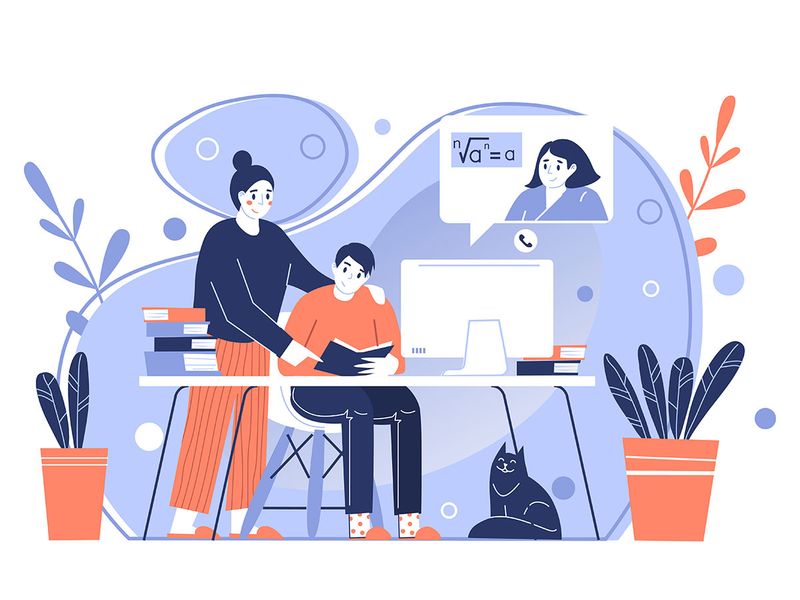
Aminah Cooper is an American expat who has been in the UAE since 2004. Her interest in homeschooling was sparked even before she had children: “During my student-teaching years we actually studied the element of education that is actually known as homeschooling, which is centuries-old in the US,” she explains. “Once I had learned about that, long before I had husband and children, I had made the decision to homeschool my children – and I just stuck with that decision.”
This meant some juggling – when she came to Dubai, she joined the private education system. By this time, she’d also been teaching her kids at home for a while. “For six years, from 2004-2010, I went into the private school system to teach. And I would teach during the day and then come home and homeschool my children,” she says.
She could, as a participant in both types of teaching methods, point out the benefits and drawbacks of both systems. She says, “As a teacher I can compare [the two] quite easily. I decided that I wanted my children to have more flexibility. In that, they could have more of a say as to what they learned. Timing and schedules [are also more flexible while homeschooling]. I also felt as though the classroom environment was a bit restrictive and wanted my children to not stay within four walls for learning. Homeschoolers feel as though the world is their classroom; they have many opportunities for learning outside the classroom.”
That doesn’t mean that if you choose to homeschool and change your mind, your kid is stuck. “Each school will make their own decision, depending on each emirate as well. [DUNEHA has examples of some students who] turned back to mainstream school and had no problem and some who went back and they were rejected because they did not have the necessary documentation and paperwork. There is a way for homeschoolers to have paperwork and to receive transcripts so long as they choose a curriculum that is accredited. And they check with the curriculum that they will provide documentation at the end of each year,” explains Cooper.
For her family, homeschooling works – besides homeschooling her own five children, she also helped her grandchildren with homeschooling before they joined public school in the US.
“Homeschooling helped me understand my kids”
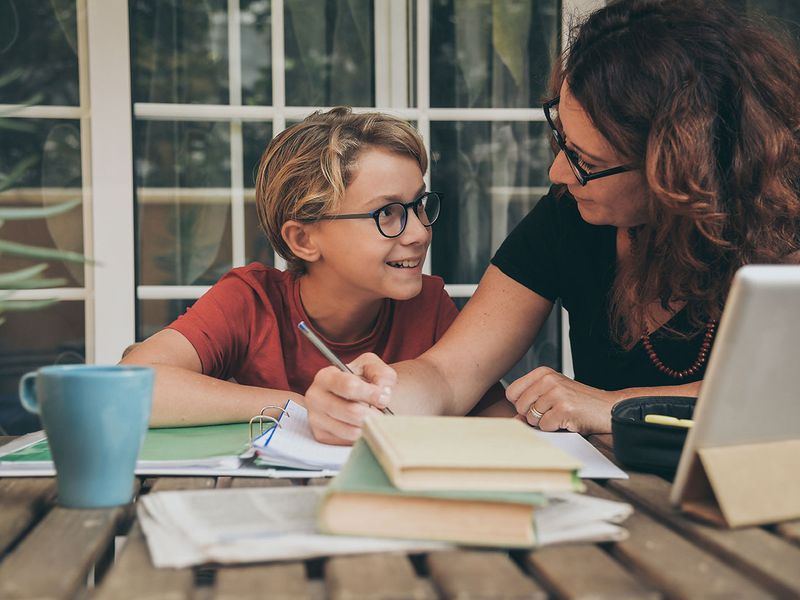
British mum-of-four Victoria has been in the UAE for 10 years and homeschooling for one. It was the pandemic that tipped the scales for her. “When COVID-19 hit and it meant distance education for the kids, we just found it very difficult to juggle,” she recalls. “I was teaching three different boys [aged five, eight and nine] three different things at the same time. They were expected to submit their work regularly every hour and then my youngest was three – he was in kindergarten; he had a lot of videos he had to watch, that he had to interact with. I had to assess and grade him and send feedback to the school; it was very overwhelming.
“On top of that, we were trying to feed everyone, keep the house clean, my husband was working from home in a high pressure job, and I was pregnant with a difficult pregnancy – it was difficult for all of us. I found my children were more focused on submitting the work than they were with actually learning. They themselves seemed to be stressed if things didn’t seem to go well with what they were learning, if things didn’t go as they planned, they’d get stressed with the systems,” she says.
At this point, says Victoria, her husband suggested homeschooling. “My husband said, ‘why don’t we try homeschooling, we can teach all the children the same thing at the same time to a standard that is age appropriate and if any of them need extra support or extra help in a subject, we have that ability to focus on it’.”
Victoria’s knee-jerk reaction was to say no; she wasn’t a teacher; she didn’t know if she could do it, especially with another baby on the way. And yet, she felt a tug of interest there.
So she began her research. “I researched a lot. I was listening to seminars, podcasts. I joined the Facebook group DUNEHA, which is Dubai and Northern Emirates Homeschool Association. They did a great seminar online on Zoom about homeschooling and different women in the UAE who homeschooled explained different curriculum they followed, different styles of homeschooling – it was very educational. I looked into different curriculums. I read a lot of books on homeschoolers and people who used different methods and I spoke to a lot of people who’d homeschooled over years and what curriculum they had used, did they buy from a company, did they get books from America, Australia, different places?”
She decided to give it a go. “I bought a UK curriculum from a company, Worldwide Education Services [WES], which specialises in providing curriculum for expats around the world and they provide tutor support, they assess the children every few weeks, and if we decide to put the kids back into school at some point we have all the paperwork required to do that,” she explains.
“The one thing I do hear a lot is homeschooling should be flexible and also that a style might suit you in the beginning but it may need to be adapted to your child, because your children learn in different ways. So I did a lot of research in the beginning and I still feel like I’m doing a lot of research right now.
“I’ve always got notes on different things that can help my child learn better. My boys are very physical, they like to visually see things, I like to do things that I feel are appropriate in that respect. So with math it’s not just looking at workbooks, we are looking at things to look to count – that sort of thing. So you know, I’m trying to be flexible on my part even though obviously having gone through the whole education system in the UK, it’s a very different way of doing things.
A calmer way
“I can see they are actually learning, they’ve improved in their math and their English, they are a lot calmer in their learning style. They don’t get anxious when they get things wrong – we can work through things together. I do find that obviously some days can be manic or some days they are dragging their heels because they don’t want to do anything. But in general, I feel like they are doing well and we have made a good decision for them,” she says.
The change of scene also helped the children in another, more unusual, way – with making friends. “At school, my eldest child had some issues with bullying and he had that in different school years and with different sets of children. So yes, in school they can get some great socialising but there’s also negative side where they are thrown in with kids they may not get along with or who make things difficult for them. So for me, the thing about homeschooling is there is a huge community in the Emirates and there are so many more homeschoolers. And we are able to do extra-curricular lessons and things outside of school hours. So we can still see our school friends after school hours but then we can meet homeschoolers during the day, we might do lessons together or trips together, so I’m not really concerned about the socialisation concept. They still see their friends from school, their friends in the neighbourhood and homeschool friends who are in a similar situation,” she adds.
“They get a better quality of friend because they get to be intentional about who they get to spend their time with.”
A growing community
She says that there are a lot of pandemic-made homeschoolers. The community has grown. “A lot of people also chose to or felt they had no choice in the pandemic to homeschool. People who during the pandemic had no choice but to homeschool because they lost their jobs, their salaries were cut, you know we just couldn’t afford the school fees. Some made the decision temporarily, some permanently. The homeschool community are so supportive, so kind, and I’ve met people though Instagram, though Facebook, and they are very supportive – they are very nice.” Plus, it allows for a stable learning environment unencumbered by whether ‘school’ is on or not.
Even post-partum, after her first C-section, Victoria says she was able to cope – with a few tweaks. “I just changed how we did it – we had workbooks, stories, I got the children to read to me, watch documentaries, we got tutors online – it was very hard but it was only a few weeks before summer started and then during the summer I started to maintain a gentle level of learning – doing the odd workbook pages for math and then some experiments and things. And then I had this curriculum from WES and that was fantastic.
“All the lesson plans, text books, the exercise books, they literally tell you exactly how to give the lessons. They give you all the materials. In that respect they are very stress free. Because even if I were tired, I could just read through what I needed to do – and we manage to do it really well now,” she explains.
Without a nanny, it can be very hard, especially when you have a home full of little ones. But when asked whether mum is run off her feet or finds some time for herself, Vitoria says: “My husband is very supportive of this journey… on weekends, I can have time to myself to read and he’ll take the kids to the pool or park. I try to meet up with my friends once in a week at the park, you know just to have to have that down-time. It might not be as often as I’d like but I do. In the evenings once the kids are asleep I like to do things for myself be it that I’m reading or painting.”
The difference in family dynamics has been stark, explains the Briton. She explains: “It made me realise that when they were going to school, we were all just getting up so early, we were all tired, we are all a bit snappy with each other.”
When they asked her to play or take time out to do something, she would often find herself saying, ‘no, no, no’. She says: “I just felt like I was racing to get stuff done; get them changed and fed and into bed. But now, I can take that time. If they want to play a game, I’ll play that game with them. It doesn’t matter if our lessons start 20 minutes later if I’m giving them some quality time. And I feel this is really important – it’s really improved our relationships. I feel I understand my children better. And it made me feel so sad that I wasn’t like that before.”
“My child skipped a grade and is finally happy with school work”
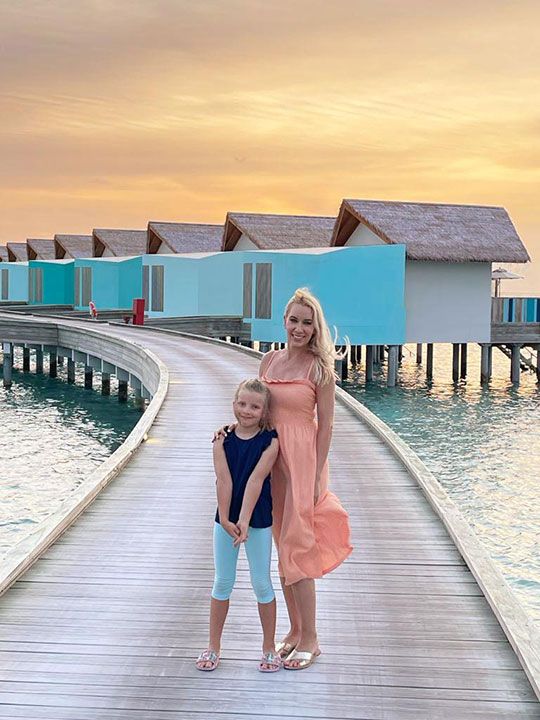
South African expat Melanie Penny, who has a six-year-old daughter, said it was COVID-19’s impact on traditional schooling options that finally convinced her to homeschool. It was something she’d been mulling for a while – her husband was pro-homeschooling after seeing the benefits his brother and sister-in-law reaped when they used this method to teach their kids. Plus, it was traumatic for both mum and daughter to be parted during drop-offs. “It was always tears dropping her off every day, she missed us, she didn’t want to be there. Then COVID-19 hit and we were forced to be at home, so I started doing the education at home and I thought, oh, there are some gaps here. Things that she should be doing and I was concerned. Like, why does she not do her letters right? Well, then I thought, ‘I’ve been looking at this curriculum from America for a long time called Timberdoodle’, so I read a bit more about that, and then June came around and we had to make the decision of whether she was going to continue with the school and I thought, no I’m going to try homeschooling.”
Timberdoodle came in two massive boxes. “It’s all book-based, no online schooling, which I prefer for this age,” she says. “And it was amazing, like, this particular curriculum covers everything – history, science, language, arts and math. There are cool STEM [Science, technology, engineering, and mathematics] activities. These are the kind of things you don’t do at school. So it’s like training a young child’s brain to think logically at a young age,” she says.
“She was doing so well she actually jumped a grade. She’s already starting second grade,” she says.
“Of course at first I was really nervous, but this curriculum that I chose it comes with a teacher’s manual – it’s very step by step. And I also have the flexibility if something is not working for my daughter, that I can switch it to something else,” she adds.
One of her chief concerns was the social skills paradigm. “Before homeschooling, that was a big concern for me but actually, it’s not at all. It’s up to the parents – I think that is the parents’ responsibility. I do know some students who don’t have a lot of friends but I think that’s mainly the parents who’ve not put in the effort to make sure that their child is socialising a lot. Most of the friends are homeschooling anyway, so we have the freedom to meet them in the mornings. We have our little network of her friends and family as well – they are all homeschooling. She sees them all the time,” says Penny.
“You as a parent know your child best and what works for them and what does not,” she says.
Books: ‘The Well Trained Mind’, by Susan Wise Bauer and Jessie Wise; ‘Homeschool Bravely’, by Jamie Erickson; and ‘The Call of the Wild + Free’ by Ainsley Arment; and ‘Home Learning Year by Year’ by Rebecca Rupp.
Good days, bad days
Just remember, she says, as with anything in life, there will be some ups and downs. “Every week there are challenges; some days are good, some days are more challenging. But there are two main challenges: following a schedule, which we do – Timberdoodle gives us a daily schedule of what we should be covering – but not being too caught up with a schedule because sometimes you have a bad day and then the child’s just not focused, not in the mood. So then just be flexible and do something else. And then some days are great.
“You are working with a child you know with her own personality and moods and so on and you just need to be patient. Expect some days are not going to be too great and don’t get too upset about it,” she adds. “And don’t beat yourself up.”
“While teaching my kids, I learn too”
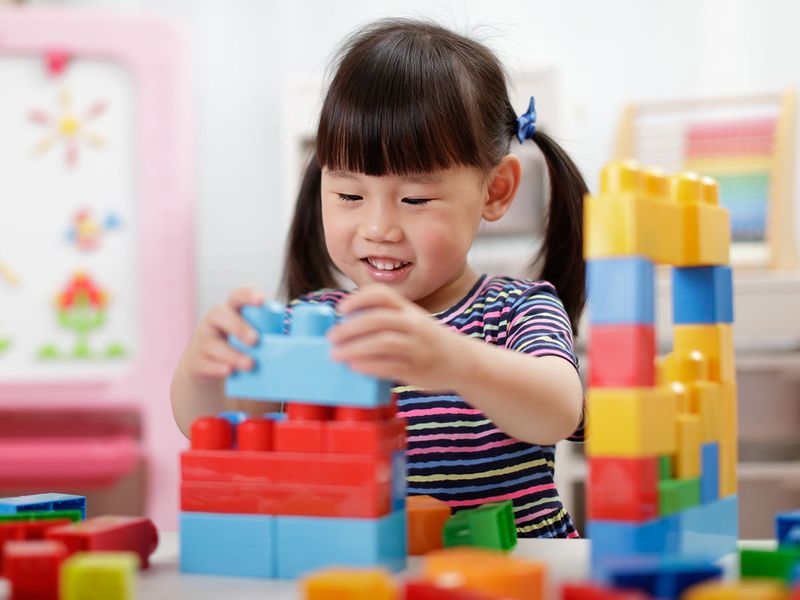
Natalia Spiegel, who manages the Instagram account @1sttimehomeschooling, has two sons; an eight-year-old and a three-year old. She tells Gulf News in an email about her homeschooling journey:
“For my eight-year-old son I’ve created an individual learning plan based on the national curriculum. We use resources from Twinkl and BBC Bitesize that are aligned with the curriculum. I like using history books for children, there are plenty of them on Amazon to choose from. That way your child can do the daily reading and learn the history at the same time.
“Another great resource is Pinterest. There are loads of posters and ideas how to explain math, grammar, science and other subjects.
“I’d say that homeschooling can be exciting. It gives you the chance to be creative while designing the plan and resources that would be fun for your child. I’m not ashamed to say that I learn a lot of things myself and I love it. For example, we use Duolingo app to study languages so we both learn at the same time. It’s bonding.
“It might be easier in my case because my [older] son is an achiever, who loves to learn and open to any new information. Some children are less motivated in learning and for them homeschooling might be a bit challenging or needs to be adjusted to be based on their interests.
“Of course homeschooling can be frustrating. I think it’s important to remember that on some days your kid wouldn’t finish all the planned work or that some topics would be challenging and therefore you’d need to spend more time and efforts to help your child get through them.
“You also need to remember that you will have to become all the teachers and the whole school for your child and that will be all the time. That’s a lot of time spent together and it is understandable that not all parents a ready for it or have the patience.
“Luckily today there are lots of homeschooling communities with weekly meetings and Facebook groups where the parents can get support. There are also numerous groups where you can ask advice re learning materials, resources, organising the learning schedule and even legal aspect of homeschooling.”
Have a topic you'd like us to cover? Write to us at parenting@gulfnews.com






